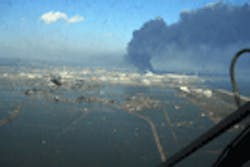Japanese truck production still curtailed by quake aftermath
Top executives of U.S. operations for three Japan-based commercial truck builders have told FleetOwner that production at their parent companies’ truck plants remain halted in the wake of the devastating earthquake and resulting tsunami that dealt massive twin blows to Japan almost two weeks ago. All three of the OEMs—Hino, Isuzu and Mitsubishi Fuso—had rolled out new truck models at the NTEA Work Truck Show earlier this month in Indianapolis.
“The damage to our Fujisawa and Tochigi plants was minimal,” Shaun Skinner, executive vp & gm of Isuzu Commercial Truck of America, reported to us today. “The decision was made to keep both plants idle this week due to continuing concerns for the recovery effort and the need for electrical power to those in need.
“Additionally,” he continued, “the team in Japan is still working to assess the impact on all our parts suppliers. I believe we will have a clearer picture next week of the impact to the supply chain and better understanding of the overall disruption to our production. “
Skinner had told FleetOwner a week ago that dealer stock and the port supply of Isuzu trucks here in the U.S. is currently good, but that “it is impossible to know right now what the longer term disruption will be, if any.”
Glenn Ellis, vp—marketing & dealer operations for Hino Motors Sales U.S.A., told FleetOwner that, as of yesterday, “we have had NO disruption to our production in our Williamstown, WV plant. The Hino plants in Japan are closed through Wednesday (Japan time). A determination for Thursday and Friday will be made on Wednesday.
“Hino Japan is working with our supply base on a daily basis and at this time, we do not anticipate any disruption to our plant in West Virginia for the foreseeable future,” he stated.
Ellis had last week told FleetOwner that the areas around Hino Motors’ Japanese plants were not heavily impacted, but had added that “there are some suppliers in the regions that have been impacted [and] that could have an effect on the plants at some point, but it is really too early to tell.”
Todd Bloom, president & CEO of Mitsubishi Fuso Truck of America, told FleetOwner that the offices in Japan were not scheduled to re-open until today, leaving him “not in a position to give you any new information” adding that he will keep us posted.
Last week, Bloom had advised FleetOwner that Mitsubishi Fuso’s Japanese offices and plant were not damaged, and he stated then that there was “no news at this point” to report.
A news story posted by IndustryWeek.com states that Sweden’s Volvo Group will “resume some production in Japan next week” at its UD Trucks plants near Tokyo and that the OEM “estimates that the production of trucks outside Japan will not be affected” by the natural disaster in Japan.According to the IndustryWeek report, following inspections and repairs Volvo has estimated that UD Trucks production in the Tokyo area “should be able to resume on a limited scale on March 28.” And with regard to sub-suppliers, “the company said that intensive efforts are in progress aimed at surveying all stages of the supplier chain” but estimated that “the production of trucks outside Japan will not be impacted to any major extent.”
However, manufacturers are feeling the impact of the disaster on the global supply chain. For example, General Motors has announced halting production of its Chevrolet Colorado and GMC Canyon midsize pickup trucks at its Shreveport, LA, plant at least for this week “due to a parts shortage resulting from the crisis in Japan,” per a company news release.
GM stated that is currently has a sufficient number of those vehicles on had to meet customer demand and that “at all other plants in North America, we continue to run normal operations.”
And according to a news item in the March 21st print edition of Ward’s Automotive Reports, at least one major Japanese component supplier is earning its customers to brace for potential parts shortages in the wake of the crisis in its homeland.
“Due to this disaster, we have infrastructure disruptions at present in the surrounding regions, and anticipate consequent production and delivery delays in a matter of days,” said a message sent by Aisin Seiki to its customers and obtained by Ward’s, as noted by associate editor Byron Pope in the report.
“We will deliver the goods as usual that are ready for shipment,” the message went on. “As for the orders subject to delay, we will inform you of details as soon as we confirm the situation.”
As pointed out by Ward’s, Aisin supplies everything from transmissions to engine systems to both care and truck makers and the bulk of its 165 facilities are in Japan.
